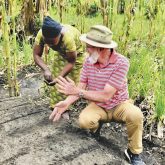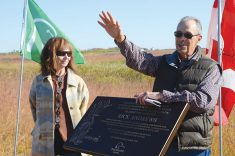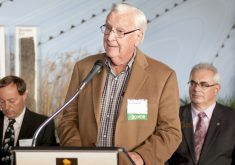The food aid was two months late.
Niger was in the grip of drought and for many complicated reasons, the food aid the Canadian Foodgrains Bank had ordered had not reached the village Jim Cornelius was visiting that morning.
He sat under a tree with a woman and her child. As she told him they had no food, her baby tried to nurse. The mother pushed the child away.
“In a moment of just enormous frustration,” Cornelius said, “I remember she lifted her blouse, she pointed to her breast and says ‘there’s no milk in these breasts for my child.’”
Read Also

Winter is the best time to see owls in Manitoba
The snowy owl is the iconic species, but there are plenty of other superb owls to be seen in winter throughout Manitoba, Donna Gamache writes.
Cornelius recalls shouting into his phone as they left the village — where was the food?
The next day, he visited a village where the food had arrived two months earlier as planned. As he sat visiting with a woman, her two little boys began to wrestle noisily nearby.
“She just had this big smile on her face, and said, ‘you know, before the food came those boys did not have energy enough to fight,” Cornelius said. “‘But now they have energy to fight.’ And for her, that made her smile.”
Those two encounters stuck with Cornelius and seemed to encapsulate why he was doing what he was doing.
Childhood in Africa
From a young age, Jim Cornelius had the sense he was part of a larger mission.
His mother — raised in Winnipeg’s west end — and his father — from Ontario — met at a Pentecostal Bible college in Saskatoon. They married and Cornelius’s father became a pastor, first in Canwood, then Yorkton, Saskatchewan. Jim Cornelius was born there.
While Cornelius’s father was very involved in local work, his mother had a bigger vision of the world and persuaded her husband he should also. When the Pentecostal Church asked the Cornelius family to go to Kenya, they said yes. His father would spend the rest of his life in international work.
“Once he got engaged, he just was fully, fully invested in that part,” he said.

Cornelius was six months old when his family transplanted to the Kisii region of Kenya, a rural area near Lake Victoria and the Tanzania border. Young Jim would go over the Tanzanian border to a Mennonite boarding school starting at first grade.
The family was largely isolated from the world at large, Jim recalled. They didn’t have newspapers, not even many books in the house.
Kenya was undergoing massive change. Then a British colony, Kenya had experienced a long period of strife as African groups, particularly the Kikuyu people, sought political equality with colonial rulers.
In late 1963, Kenya gained its independence from Britain.
“I still have vivid memories of the lead-up to independence in Kenya in 1963,” said Cornelius.
He recalled driving through the Kisii region and watching kids coming out onto the road, raising their fingers in a ‘V’ shape, representing ‘uhuru’ — ‘freedom’ in Swahili.
“They would just wave as we went by, and would be shouting and singing, ‘uhuru, uhuru, uhuru.’”
He’d come to understand what this meant in university when he took a course in African history. Cornelius had studied business administration at Ryerson Polytechnical Institute — now Ryerson University — for a year before transferring to York University to study sociology.
He took a course in African studies and was intrigued enough to add this as a double major.
Cornelius then entered what was then one of the few international development programs in Canada at Carleton University. He graduated in 1979 as a recession began and picked up contract work as a consultant in international development where he could.
This work included travelling to assess an aid program for refugees from Liberia and Sierra Leone in Guinea where he spoke to officials and refugees to decide if the program was helping as it ought. He travelled to East Africa after the Rwanda crisis where he and an agriculture economist spent almost a month assessing if sourcing food locally had driven up prices in the area, and if it had actually resulted in more efficient delivery.
In his late 30s, Cornelius worked at an applied social research firm in Ottawa, and while this was mostly domestic work he always carved out time for international work.
During that time, his father died and this led him to mull over his future.
“I’m now in the heart of my career. What am I doing?” said Cornelius.
In the end, he realized he wasn’t meant for domestic work. He needed to work in the wider world. Cornelius resigned from the research firm and returned to consulting.
At the Canadian Foodgrains Bank
In 1996, the Canadian Foodgrains Bank hired Cornelius to manage a project in Eritrea, actually a Canadian government program contracted to CFGB. A year later, CFGB was looking for a new executive director and, encouraged by others to apply, Cornelius got the job and moved to Winnipeg.
He never expected he’d spend the next 23 years there, Cornelius said.
Since then, a few big things have changed.
“Our mission hasn’t changed,” Cornelius said. “The connection to rural communities, farming communities has not changed. The ownership and involvement of Canadian churches has not changed.”
One significant change came after about 10 years of lobbying work on the part of CFGB and other groups like Oxfam Canada. In 2008, the Canadian government dropped the requirement that 90 per cent of Canadian food aid had to be bought in Canada.
This would boost developing world farmers, Cornelius told the Western Producer in 2008, and save money.
This was part of an increase in policy work — something Cornelius said has been questioned, as policy work costs money that doesn’t go directly into aid. Small, strategic investments can result in much larger changes than the money can make on its own, he said.
For instance, as part of its work to promote conservation agriculture and build livelihoods in East Africa, CFGB worked with local governments to try to persuade them to build conservation agriculture into their extension system. The government of Ethiopia has come on board and has worked with CFGB to build a conservation agriculture curriculum and train its trainers.
CFGB has also moved away from giving food to those in need in favour of cash and vouchers — a move made possible when it was no longer required to source food in Canada and other restrictions loosened.
For instance, in 2013, Cornelius told the Western Producers about Syrian refugees living in Lebanon. These people were not allowed to form camps but were scattered throughout the general population — some living at the edges of fields or renting hotel rooms.
There was food around them, but, “there’s often nothing left over after rent for food,” he said.
Cornelius said he set two goals when he became executive director. A member of the Anglican Church, Cornelius wanted that church to join CFGB. He also wanted to bring in the Catholics. Both joined in 2007.
“Took me awhile, but I was very happy when both of them joined, and so now I feel like we have a more complete family,” said Cornelius.
After 23 years of international development work, Cornelius says he’s no revolutionary. He’s more of a reformist.
“I’m a believer in institutions,” he said. “I was before, but I continue to be because you need institutions. It’s how you actually work together.
“I’ve seen too many places in the world where institutions are not functioning, where government is not functioning, and they are not happy places.
“Some people find working with all these systems and slow-moving structures and everything just to be immensely frustrating. I enjoy it,” Cornelius said. “I just understand that things take time.”

He said he has a lot of respect for government officials and has found ways to work with leaders from all parties and be productive, as with leaders of 15 very different church groups.
Very early on in the job, said Cornelius, he was in a church basement in Saskatchewan with CFGB supporters. It struck him that these people came from divergent church and political backgrounds, histories that should have kept them apart.
With some probing, he said, it became clear that, “… they all agreed that hunger was not acceptable, and they all agreed that they had a responsibility to do something about it, that they couldn’t just look the other way.”
Keeping that mission out in front, while allowing people to work within diversity of perspective, required constant focus and effort, said Cornelius.
“That can very easily fall apart if you aren’t deliberate.”
The same went for maintaining a partnership with the Canadian government, but it’s those opportunities to engage, Cornelius said he’d miss.
What next?
This September, Cornelius retired from his role at the Canadian Foodgrains Bank.
Cornelius will continue at CFGB part time to support incoming executive director Andy Harrington and to consult on a couple of ongoing projects.
When asked what he’d do now that he’s not executive director of an international relief organization, Cornelius told the Co-operator a story.
His mom spent over 20 years working in Africa as a Pentecostal missionary before returning to Canada, he said. She was 63 when her husband, Cornelius’s dad, died. Two years later she “retired” and returned to Africa to work another 12 years as a volunteer.
“That was her retirement,” Cornelius said, laughing.
Cornelius said he’d start by taking a bit of time to decompress from the “all-consuming and frantic” work and to get some advice.
















